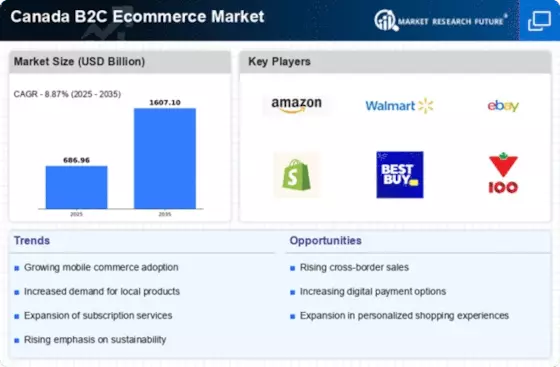Rise of Social Commerce
The Canada B2C Ecommerce Market is witnessing a significant rise in social commerce, where social media platforms serve as vital channels for product discovery and sales. As of January 2026, platforms such as Instagram and Facebook have integrated shopping features that allow users to purchase products directly through their feeds. This trend is particularly appealing to younger demographics, who are increasingly influenced by social media in their purchasing decisions. Recent statistics indicate that over 40 percent of Canadian consumers have made a purchase through social media in the past year. The integration of social commerce into the Canada B2C Ecommerce Market not only enhances customer engagement but also provides businesses with innovative marketing opportunities. As this trend continues to evolve, it is likely to reshape the landscape of online retail in Canada.
Growing Internet Penetration
The Canada B2C Ecommerce Market is experiencing a notable surge in internet penetration, which is a critical driver for online shopping. As of January 2026, approximately 95 percent of Canadians have access to the internet, facilitating a robust online shopping environment. This widespread connectivity enables consumers to explore a plethora of products and services from the comfort of their homes. Furthermore, the increasing availability of high-speed internet across urban and rural areas enhances the shopping experience, allowing for seamless transactions. The growth in internet users is likely to continue, as government initiatives aim to improve digital infrastructure. Consequently, this trend is expected to bolster the Canada B2C Ecommerce Market, as more consumers engage in online shopping, leading to increased sales and market expansion.
Advancements in Payment Solutions
The Canada B2C Ecommerce Market is significantly influenced by advancements in payment solutions, which enhance the convenience and security of online transactions. As of January 2026, various payment options, including digital wallets, contactless payments, and buy-now-pay-later services, have gained traction among Canadian consumers. This diversification of payment methods caters to different consumer preferences, thereby encouraging more individuals to shop online. According to recent data, nearly 60 percent of Canadians prefer using digital payment methods for their online purchases. The ongoing innovation in payment technologies, coupled with a focus on cybersecurity, is likely to further instill consumer confidence in online shopping. As a result, the Canada B2C Ecommerce Market is poised for growth, driven by the increasing adoption of these advanced payment solutions.
Increased Focus on Customer Experience
The Canada B2C Ecommerce Market is increasingly prioritizing customer experience as a key driver of growth. As of January 2026, businesses are investing in user-friendly website designs, personalized shopping experiences, and efficient customer service to enhance satisfaction. Research indicates that 70 percent of Canadian consumers are more likely to return to a website that offers a seamless shopping experience. Companies are leveraging data analytics to understand consumer behavior and preferences, allowing for tailored marketing strategies. This focus on customer experience not only fosters brand loyalty but also encourages repeat purchases, which are essential for sustained growth in the Canada B2C Ecommerce Market. As competition intensifies, businesses that excel in delivering exceptional customer experiences are likely to thrive.
Government Support for E-commerce Growth
The Canada B2C Ecommerce Market benefits from robust government support aimed at fostering e-commerce growth. As of January 2026, various initiatives have been implemented to promote digital trade and support small businesses in transitioning to online platforms. The Canadian government has introduced funding programs and resources to assist entrepreneurs in establishing their e-commerce operations. Additionally, policies aimed at reducing barriers to online trade, such as streamlined regulations and improved logistics infrastructure, are being prioritized. This supportive environment is likely to encourage more businesses to enter the Canada B2C Ecommerce Market, thereby expanding the overall market size. As government efforts continue to evolve, they are expected to play a pivotal role in shaping the future of e-commerce in Canada.
















